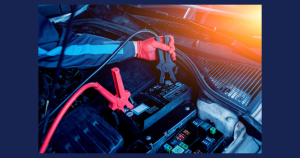 Your car battery provides the charge that starts your engine. When you press the button or turn the key, the battery sends an electrical charge to the starter motor. The starter motor cranks your engine, and you’ll be enjoying your Toyota driving experience again in no time! The battery, however, has a limited life and will eventually need to be replaced. When it’s time for a new car battery, Priority Toyota Chesapeake can help you find the perfect one for your model. These are some of the signs to be aware of that your battery is beginning to fail.
Your car battery provides the charge that starts your engine. When you press the button or turn the key, the battery sends an electrical charge to the starter motor. The starter motor cranks your engine, and you’ll be enjoying your Toyota driving experience again in no time! The battery, however, has a limited life and will eventually need to be replaced. When it’s time for a new car battery, Priority Toyota Chesapeake can help you find the perfect one for your model. These are some of the signs to be aware of that your battery is beginning to fail.
Difficulty Starting
Your engine should start almost immediately after you turn the key or press the starter button. If you hear the sound of a laboring crank, one of the most likely causes could be a failing battery. As your battery gets older, it gets weaker. An older battery loses its ability to fully charge, and its maximum charging capacity also begins to drop.
The labored crank shows that your battery doesn’t have enough power to start your engine. It has to build up enough power to provide the necessary charge. In our service department, we will test your battery for signs of wear, and we will also test your alternator. A failing alternator may not be charging the battery sufficiently. We can replace the battery or the alternator depending on the source of the problem.
Bad Smells
A foul rotten egg smell from under the hood signals a battery failure. Your battery contains several different chemicals that react with the copper plates and other components in your battery to store electricity. One of the main chemicals is sulfuric acid, which gradually breaks down as your battery operates. The sulfuric acid releases hydrogen gas that can escape from your battery.
Once the hydrogen escapes, it will mix with sulfur gas in the engine and form hydrogen sulfide. This gas is highly corrosive and has a distinct rotten egg smell. Once hydrogen gas starts escaping from your battery, your battery is already failing and will need to be replaced as soon as possible. The hydrogen sulfide will also begin to corrode the battery terminals, so you can check for this visual clue.
Your Battery Is Old
As we saw above, a car battery has a limited lifespan. On average, a battery will last for three to five years before it needs replacement, though it may be shorter due to extreme weather conditions. The older the battery, the more likely it is to develop problems. These problems will become evident through signs like dim interior lights, or failing accessories when the engine is off.
We recommend that you have a battery test within three years to test the durability and capacity of your battery. Our testing machine will subject the battery to a range of tests, and we can replace it if it’s failing.
Don’t let a dead battery leave you stranded! If you have a battery problem, call us at Priority Toyota Chesapeake. We’ll get your vehicle taken care of in no time!



